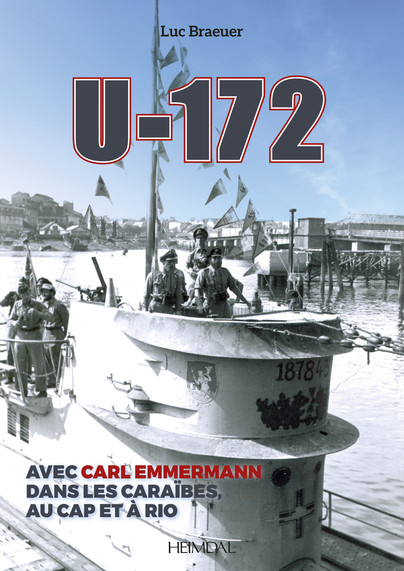U-172 (Hardback)
Avec carl Emmermann, dans les Carîbes, au Cap et à RIO
(click here for international delivery rates)
Need a currency converter? Check XE.com for live rates
When U-172, commanded by Carl Emmermann left Kiel on 22 April 1942, the second lucky period for German submarines was ending with the Americans setting up convoys along their coast. From the beginning of the conflict, the means of fighting submarines brought in to play by the Allies, had increased considerably : development of on-board radar, increased numbers of escorts and planes, decrypting submarine radio messages, etc. As a result, combat conditions had seriously deteriorated on the German side.
However, from May 1942 to September 1943, Carl Emmermann’s U-172 sank 26 ships during combat patrols, and thus overtook the 150 000-ton figure of Allied shipping destroyed. U-172 was thus 15th of all the U-Boote which had obtained the best results, an exceptional result considering the period in the war. First of all because this submarine went to areas which were especially distant where success
was still possible: the Caribbean for the first mission; the Cape in South Africa for the second where it took part in a surprise attack in a zone where no U-Boot had ever strayed until then; the centre of the Atlantic for its third mission where two convoys were chased in a pack right up to the African coast; the coast of Brazil for the fourth where it was the only one out of seven U-Boote engaged to return.
The captain was an good officer and much liked by his men: members of a crew attached to their CO who held on to them preciously from one mission to the next. At the end of his 4th combat mission, Carl Emmermann was the 25th commanding officer of the submarine arm to be awarded the Knights Cross with oak leaves. He accepted a land posting and became the head of the 6th Flotilla at Saint-Nazaire at the beginning of November 1943. U-172 which had already survived 12 air and sea attacks, left on its 6th and last patrol. Without its charismatic captain and in even more difficult combat conditions, it was sunk 21 days after it left.
The access the author, a U-Boot specialist, had to Emmermann’s photos preserved in the U-Boot-Archiv and to several photos taken by Helmut Berndt, the war correspondent, enabled the book to illustrate this particular captain’s surprising patrols with 250 exceptional unpublished photos. Thanks to the translation of the log book, to the eye-witness account by Captain Emmermann himself and the patrol sketches, you can follow U-172 on its missions across distant oceans…














